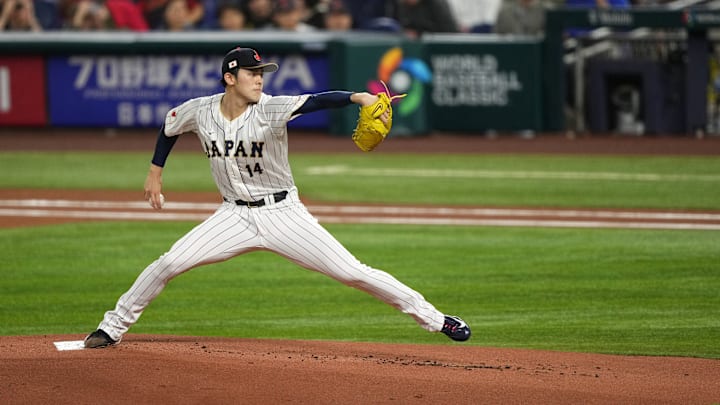The Pittsburgh Pirates should stack up on international money when they can because of high-end talent potentially coming over from Japan next off-season
The Pittsburgh Pirates need to stack up on international money. They have made trades to get international spending money in the past, such as in 2020 when they traded Jarrod Dyson to the Chicago White Sox and this past year when they sent Austin Hedges to the Texas Rangers. However, next year, one of the best international players could make their way over to the United States, and that’s Roki Sasaki.
Sasaki only pitched 91 innings last year but had just a 1.78 ERA, 0.75 WHIP, and 7.94 K:BB ratio. The young right-hander struck out nearly 40% of the opponents who stepped to the plate against him (39.1%) while only clocking in with a 4.9% walk rate. He was also great at preventing home runs with a 0.10 HR/9 rate. Sasaki throws extremely hard, regularly hitting 100 MPH.
The first thing to understand is Sasaki is not like Yoshinobu Yamamoto, Shota Imanaga, or similar predecessors (Masahiro Tanaka, Kodai Senga, Yusei Kikuchi, etc.). They had all reached professional international free agent status, meaning that teams could offer however much they felt like. There’s no cap or limit as to how much teams can spend on Yamamoto or Imanaga because they are considered foreign professional free agents (players who are 25 or older and have played at least six years in a foreign professional league, as per MLB's rules).
Sasaki, however, is not a foreign professional free agent by these standards. He is only 22 and 2024 will only be his fourth pro season. The best example of what I mean is when Shohei Ohtani signed his first contract with the Los Angeles Angels. Ohtani did not sign a mega contract when he first came over from Japan. He signed a minor league deal with a $2.315 million signing bonus. Ohtani’s contract wasn’t structured any differently than Oneil Cruz’s, Henry Davis’s, or Endy Rodriguez’s. He had three pre-arb years and then three arbitration years.
In all honesty, had the Marines decided to post Sasaki when he requested, the Pirates would have had a really good chance to sign him. Up to that point, they still had a good chunk of their international money left. They wouldn’t be bidding with the Dodgers and their blank checks. If anything, the Dodgers would have to catch up to the Pirates.
One thing to remember is that most trades for international money aren’t big trades. Hedges and Dyson are probably two of the higher-profile player-for-international slot money swaps in recent baseball history. In short, most trades for just international slot money are relatively small, so the Pirates could rack up international money without making any major trades.
Even if Sasaki doesn’t make the move to the United States next off-season, we already saw a large influx of Asian talent this winter. We could see more free agents of Sasaki’s type request to get posted next off-season. Plus, international money always comes in handy.
